浅谈英语语言中的性别歧视现象及其规避
- 格式:pdf
- 大小:211.59 KB
- 文档页数:3
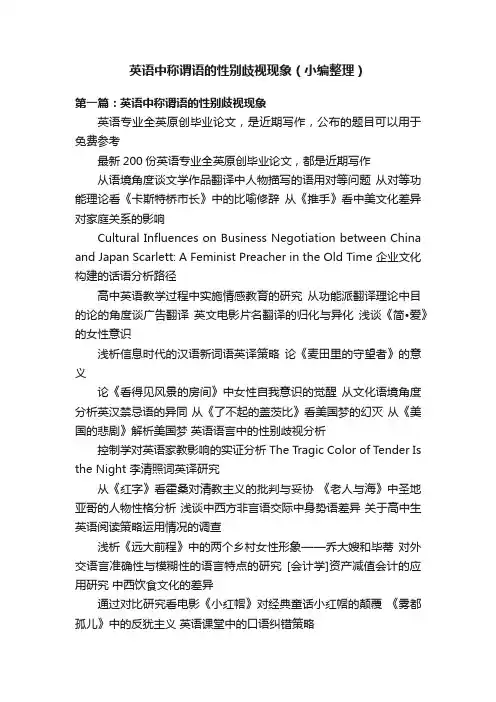
英语中称谓语的性别歧视现象(小编整理)第一篇:英语中称谓语的性别歧视现象英语专业全英原创毕业论文,是近期写作,公布的题目可以用于免费参考最新200份英语专业全英原创毕业论文,都是近期写作从语境角度谈文学作品翻译中人物描写的语用对等问题从对等功能理论看《卡斯特桥市长》中的比喻修辞从《推手》看中美文化差异对家庭关系的影响Cultural Influences on Business Negotiation between China and Japan Scarlett: A Feminist Preacher in the Old Time 企业文化构建的话语分析路径高中英语教学过程中实施情感教育的研究从功能派翻译理论中目的论的角度谈广告翻译英文电影片名翻译的归化与异化浅谈《简•爱》的女性意识浅析信息时代的汉语新词语英译策略论《麦田里的守望者》的意义论《看得见风景的房间》中女性自我意识的觉醒从文化语境角度分析英汉禁忌语的异同从《了不起的盖茨比》看美国梦的幻灭从《美国的悲剧》解析美国梦英语语言中的性别歧视分析控制学对英语家教影响的实证分析 The Tragic Color of Tender Is the Night 李清照词英译研究从《红字》看霍桑对清教主义的批判与妥协《老人与海》中圣地亚哥的人物性格分析浅谈中西方非言语交际中身势语差异关于高中生英语阅读策略运用情况的调查浅析《远大前程》中的两个乡村女性形象——乔大嫂和毕蒂对外交语言准确性与模糊性的语言特点的研究[会计学]资产减值会计的应用研究中西饮食文化的差异通过对比研究看电影《小红帽》对经典童话小红帽的颠覆《雾都孤儿》中的反犹主义英语课堂中的口语纠错策略浅谈自有品牌在中国零售企业的发展《瓦尔登湖》中寂寞观的超验主义分析言语行为理论视角下的商务索赔信函话语分析论中西饮食文化的差异欧•亨利短篇小说人物形象分析之善良特性On the Disposal of Cultural Differences in the Translation 论《紫色》中的性别暴力英美日常交际礼仪对比分析以《新时代汉英大辞典》为例析中文谚语英译A Popular Form of Subtitles Translation by Fansub Group on the Internet 从《女勇士》中的女性形象看文化差异英语专业全英原创毕业论文,是近期写作,公布的题目可以用于免费参考梭罗的《瓦尔登湖》和道家思想在自然观上的比较 44 浅析中西方颜色词所隐含的文化差异及翻译策略浅谈《认真的重要性》里现实主义和唯美主义的冲突 46 中国英语与中式英语之比较 47 英汉颜色词的文化内涵与翻译英汉“批评”类动词的语义成分及词化模式分析 49 从功能翻译理论浅谈公示语翻译A New View of Feminism in The Mill on the Floss River 51 从跨文化的角度研究中英幽默A Survey of the Manifestations of “Babel” in the Movie Babel 53 面部表情和目视行为的跨文化研究英语专业学生议论文写作中连接词使用情况研究 55 英汉广告互译的顺应化研究 56 英文商标的汉译英语中显性和隐性的性别歧视浅析《喜福会》中的中美文化碰撞与融合 59 论《杀死一只知更鸟》的成长主题 60 基于语义场理论的英语词汇习得研究A Study of Humor in Films and TV Series Subtitles and Its Translation 62 论旅游广告的显影性The Application of Situational Approach in Middle School English Teaching 64 中小学辅导机构英语教学模式——一对一教学与小班课堂教学教案的比较分析 65 性格和命运--《小妇人》中四姐妹分析 66 美中传统文化对于其家庭教育的影响 67 论《海浪》中体现的死亡意识和生命意识68 从三美原则看中国古诗词中酒意象的英译69 浅析美国慈善捐赠的文化动因浪漫和现实冲突下的宿命论思想——赏析欧·亨利的《命运之路》The Embodiment of Xu Yuanchong’s“Beauty in Three Aspects”in the English Translation of Poetry of the Tang Dynasty 72 乌托邦和老子道家思想的比较研究宗教枷锁下的人性挣扎——《红字》中丁梅斯代尔形象解读74 基于关联理论的名动转换词语义认知研究 75 英汉习语中价值观的差异“金玉良缘” 与“幸福终点”——浅析中西婚姻差异77 英语基本味觉词“甜/苦”的隐喻机制 78 《名利场》中女性命运对比 79 凯瑟琳与苔丝悲剧命运的比较《一位女士的画像》伊莎贝尔婚姻悲剧的原因分析81 Struggle and Compromise in North and South 82 Cultural Differences Between English and Chinese Greetings 83 A Study of Nonverbal Communication 84 通过分析《德伯家的苔丝》中主要人物形象分析哈代的宿命论思想85 论商务名片英译——以功能对等为指导英语专业全英原创毕业论文,是近期写作,公布的题目可以用于免费参考论基督教教义对美国人慈善观的影响 87 以实玛利是谁--《白鲸》与康德哲学 88 英式英语与美式英语的词汇差异 89 初中英语课堂教学现状调查 90 《游泳者》中的艺术特色 91 《红字》中海斯特性格分析简析美国个性化教育对家庭教育的积极影响 93 《麦克白》的独白The Influence of Westward Movement on American National Character 95 对英文广告中模糊语言美学功能的理论探究96 论英汉翻译中的文化因素汉语公示语英译之跨文化交际研究The Analysis of Narrative Techniques in William Faulkner’s “A Rose for Emily” 99 对《傲慢与偏见》中的婚姻观重新解读 100 浅析《老人与海》中的英雄主义歇斯底里的舞台自语者——《寻找格林先生》主题解读 102 《洛丽塔》—时间的悲剧幽默元素在英语电影和电视剧中的翻译104 商务英语合同的翻译特点及策略研究 105 《红字》中场景描写及其象征意义 106 谈品牌广告文体特点及其翻译布什总统演讲词中幽默话语的语用功能分析108 The Artistic Value of The Call of the Wild 109 试论爱伦•坡的作品在当时遭受非议的必然性An Analysis of Symbolism in Tess of the D’Urbervilles论女同性恋成长小说--简析珍妮特.温特森《橘子不是唯一的水果》 112 《野草在歌唱》中野草的象征寓意解读 113 论中西方时间观念差异对日常生活的影响 114 《最蓝的眼睛》中佩科拉的悲剧论海明威小说《老人与海》中对生活的反思116 女性哥特视角下的《蝴蝶梦》研究《觉醒》女主人公-艾德娜追求自我的过程 118 中美大学生请求语策略对比研究Family Values in Desperate Housewives 120 解析凯特肖班的《觉醒》中的哥特因素:浅析维多利亚时期妇女文学的觉醒121 奥巴马竞选总统获胜演讲的文体分析An Analysis of Women’s Status in Pride and Prejudice 123 《爱玛》中的女权思想解读论“看,易,写”方法在旅游翻译中的应用125 外贸英语函电的文体特征及翻译对策A study on Lin Yutang’s Translation standards:faithfulness,fluency and beauty 127 On Analysis of Jonathan Swift’s Satiric Arts in Gulliver’s Travels 128 探析中国电影英译的几个误区春晚流行语的社会语言学和修辞学研究英语专业全英原创毕业论文,是近期写作,公布的题目可以用于免费参考A Comparison Between the History of Development of Law in Western Countries and China 131 对《别对我说谎》中非言语因素的分析Study on Dietetic Cultures in Different Regions in China 133 英汉汽车广告中常用“滑溜词”的对比分析压力下的优雅?—美国当代战争小说与电影中的人性135 论广告定位中的文化冲突及对策 136 约翰•斯坦贝克女性观流变初探母语文化对译者风格的影响-以<红楼梦>中称谓语的翻译为例138 高中英语新课标在xx中实施情况调查与分析 139 旅游翻译中的跨文化语用失误 140 《黑暗之心》的人性探究 141 商务合同中的语篇衔接分析归化和异化在影片名翻译中的应用143 英语写作中的母语迁移作用及教学启示 144 《蝴蝶梦》中的女权主义分析赫索格与玛德琳性格形成的影响因素---解读索尔贝娄的《赫索格》146 论企业简介中文到英文的翻译147 生态视角下解读《荒野的呼唤》 148 商务信函中的介词用法从纽马克的交际翻译和语义翻译理论论英语新闻标题的翻译150 从话语权力的角度看电影《换子疑云》151 浅析《德伯家的苔丝》中两位男主人公152 从冲突到融合——从文化的角度看《喜福会》 153 《远大前程》中的“远大”可以是“错误”的154 中美文化差异对商务谈判的影响 155 分析《宠儿》中塞丝的创伤与愈合156 A Comparative Study of English and Chinese Taboos in the Context of Intercultural Communication 157 维多利亚时期简爱与苔丝的不同命运158 TPR教学法在幼儿英语教学中的应用159 《红楼梦》两英译本中习语翻译的比较160 从心理分析的角度探索《马贩子的女儿》中主要人物的心理现象 161 英汉动物词汇隐喻意义的对比研究 162 从功能对等理论谈中国小吃名英译163 从叔本华的哲学思想角度简析《德伯家的苔丝》中苔丝的悲剧 164 女性主义视角下《傲慢与偏见》的情态意义解读 165 浅析《宠儿》中人物塞丝的畸形母爱产生的根源 166 林黛玉和简.爱不同命运的对比 167 对《秀拉》中死亡事件的探究168 A Comparative Study of MTVs in China and U.S.169 [税务管理]我国开征遗产税国际借鉴和政策选择研究 170 论华兹华斯诗歌中的自然观171 日用品广告语言中中西方价值观差异比较研究 172 商务英语信函中礼貌策略初探英语专业全英原创毕业论文,是近期写作,公布的题目可以用于免费参考173 从文本类型角度看旅游宣传资料的汉英翻译 174 从人文主义角度解读《失乐园》中撒旦的形象175 从交际翻译视角看企业简介的汉英翻译 176 视频辅助和背景知识对听力理解的作用 177 西方影视作品中的美国婚俗研究 178 英汉思维模式差异的对比研究 179 《冰与火之歌》的人文主义分析 180 英汉动物习语中隐喻用法的对比分析 181 等效理论框架下的中国菜肴英译研究 182 论《宠儿》中的象征意象183 《德伯家的苔丝》中苔丝悲剧的分析184 从唯美主义角度分析《莎乐美》中邪恶的灵魂 185 从合作原则的违反看小品“卖拐”中的幽默 186 浅析英语中的性别歧视187 A Comparative Study of A Wordsworth’s Nature Poem and One by Tao Yuanming 188 A Cultural Approach to the Translation of Movie Titles 189 论《进入黑夜的漫长旅程》的悲剧成因 190 浅析《飘》中斯嘉丽的三次婚姻191 论《哈克贝里芬历险记》中的口语化语言、幽默讽刺和地方色彩 192 从功能派目的论角度看商品说明书的英汉翻译 193 英语阅读有效教学活动设计研究194 功能翻译理论关照下的新闻英语标题翻译 195 中西商务谈判风格差异的文化渊源 196 文学翻译中的对等197 The Elementary Stage Translation Teaching Design for Undergraduate English Majors 198 初中英语课堂教学的任务型活动设计 199 公示语英译错误分析200 英语中称谓语的性别歧视现象第二篇:英语中的性别歧视现象英语语言中性别歧视语言现象英语中的性别歧视现象[论文关键词]性别歧视词汇文化[论文摘要]语言在社会生活中处于十分重要的地位,它的使用从一个侧面反映社会思想,态度和文化。
![分析英语中的性别歧视现象[开题报告_文献综述毕业论文]](https://uimg.taocdn.com/57f102c3b9d528ea80c77907.webp)
毕业论文开题报告英语分析英语中的性别歧视现象一、论文选题的背景、意义(一)背景及意义语言是折射社会生活的一面镜子,社会价值观影响着人的语言使用。
在英语使用中,性别歧视现象屡见不鲜。
性别歧视是由于人的价值观的不同而产生的,这种不公平的价值观来源于社会的各个方面对人思维的影响,并体现在人们的日常活动中,进而使得语言使用也带上性别歧视的色彩。
不管社会发展到何种程度,人们对于男女性别的区别对待不会中止,因而性别歧视这个话题是社会科学学者们孜孜不倦钻研的一个课题。
语言中的性别歧视是在揭示了语言的不对称现象以后提出的。
其理论依据是“萨丕尔-沃尔夫假说”:语言不仅仅是社会的产物,它还能反过来影响人的思维和精神的构建。
一般而论,语言性别歧视一词为其通称说法,泛指语言使用中的诸种性别歧视现象;性别歧视语言一词为其实指内容,专指各种含有性别歧视的具体语言表现形式。
传统的西方社会,妇女在整体上是低于男人的等级。
在经济生活、司法事务和家庭生活中,她们普遍受到歧视占统治地位的观念认为,妇女附属于男人(父亲或丈夫),她们愚昧和低能,不能参与政治生活,不能享用任何政治权利,不能拥有独立的政治地位。
千百年来,三大宗教的教规、教义无不在体现性别差异的同时,贬低女性的羸弱。
绝大多数宗教都崇尚家庭,主张妇女驯从和服务于丈夫,不同的宗教从各自的角度均肯定妇女次于男性的地位。
16世纪以后,女子教育又始终掌握在教会的手中。
教会的目的既简单又实际,一方面给女子找一些东西学习,以免她们无所事事、想入非非;另一方面通过教育,把她们培养成驯服、贞洁的基督徒,善于做女红的妻子和母亲。
直到19世纪80年代,教会对妇女教育的垄断权才开始松动,欧洲的女子教育才逐步向世俗化、公共化和高层次化发展。
这些都是造成语言对女性性别歧视的社会原因。
语言是思想的直接体现,它作为人类思想的载体和主要的交际媒介,直接反映语言使用者的思想和价值观。
在社会语言学看来,语言性别歧视现象的研究,不单纯是一个语言学的问题——语言学家应该透过这种表面现象,结合语言哲学研究、语言文化研究、社会学研究,以及认知科学研究,采用一种崭新的观察视野,探索语言与思维关系问题,揭示语言使用过程中的亚文化现象,研讨大众意识对语言改革的影响,考察语言在人类认识和表述世界过程中所起的双重功能。
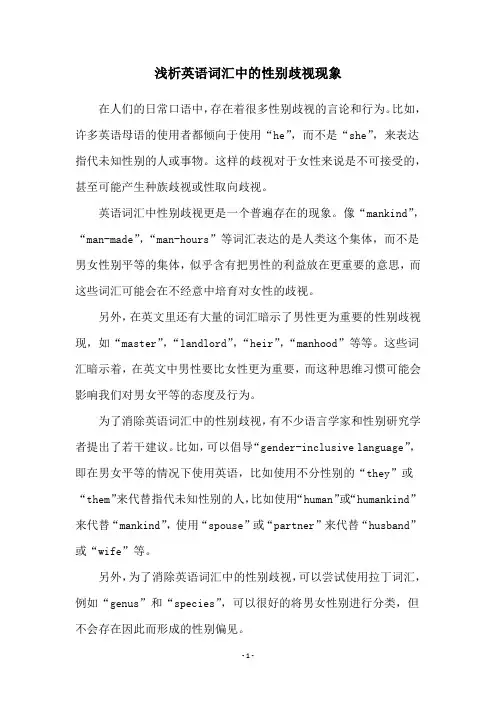
浅析英语词汇中的性别歧视现象在人们的日常口语中,存在着很多性别歧视的言论和行为。
比如,许多英语母语的使用者都倾向于使用“he”,而不是“she”,来表达指代未知性别的人或事物。
这样的歧视对于女性来说是不可接受的,甚至可能产生种族歧视或性取向歧视。
英语词汇中性别歧视更是一个普遍存在的现象。
像“mankind”,“man-made”,“man-hours”等词汇表达的是人类这个集体,而不是男女性别平等的集体,似乎含有把男性的利益放在更重要的意思,而这些词汇可能会在不经意中培育对女性的歧视。
另外,在英文里还有大量的词汇暗示了男性更为重要的性别歧视现,如“master”,“landlord”,“heir”,“manhood”等等。
这些词汇暗示着,在英文中男性要比女性更为重要,而这种思维习惯可能会影响我们对男女平等的态度及行为。
为了消除英语词汇中的性别歧视,有不少语言学家和性别研究学者提出了若干建议。
比如,可以倡导“gender-inclusive language”,即在男女平等的情况下使用英语,比如使用不分性别的“they”或“them”来代替指代未知性别的人,比如使用“human”或“humankind”来代替“mankind”,使用“spouse”或“partner”来代替“husband”或“wife”等。
另外,为了消除英语词汇中的性别歧视,可以尝试使用拉丁词汇,例如“genus”和“species”,可以很好的将男女性别进行分类,但不会存在因此而形成的性别偏见。
为了消除英语词汇中的性别歧视,一些语言学者和教育者建议更多地使用双性词汇,并且在学校教育中培养孩子接受男女平等的思想,而不是对性别不平等的观念。
综上,消除英语词汇中的性别歧视需要我们的共同努力。
语言学者应该提供合理的解决方案,而社会成员,教育者也要改变自身的言行举止,使用更加包容性、男女平等的英语词汇,为实现男女平等的社会而努力。
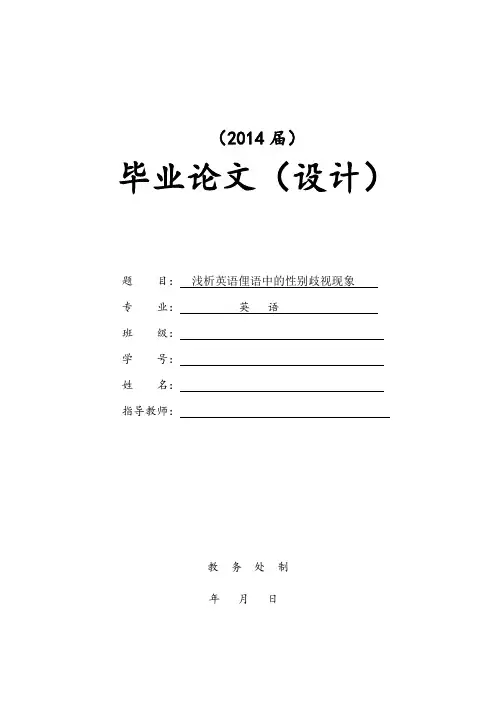
(2014届)毕业论文(设计)题目:浅析英语俚语中的性别歧视现象专业:英语班级:学号:姓名:指导教师:教务处制年月日摘要性别歧视,主要指的是对女性的歧视。
几千年以来,女性在社会、政治、经济方面都受到不平等的待遇。
男尊女卑是社会中长期存在的客观现象,不可避免的反映到语言和语言使用中来,由此形成语言性别歧视。
本文着重分析了英语俚语中性别歧视现象和产生原因以及今后可能发展的趋势。
首先介绍了何为英语俚语以及英语俚语的特征。
然后从四个方面探讨了英语俚语中存在的性别歧视现象,即它主要体现在特殊俚语上、描述两性的相关俚语表达上、俚语词义的变化过程以及社会公众对两性使用俚语的看法上。
接着在前面几章的基础上分析了英语中性别歧视现象形成的根源。
通过分析,发现英语俚语中的性别歧视归根结底还是由深刻的社会、历史和文化等方面的因素造成的。
接着论述了俚语中的性别歧视在今后的发展趋势。
最后是文章的结论部分,最根本的解决办法还是要彻底改变社会中长期对女性的歧视,进一步提高妇女的社会地位,只有这样,才能消除英语俚语中的性别歧视。
关键词:英语俚语;性别歧视AbstractThe sexism mainly refers to the discrimination against women. Thousands of years, women are treated unfairly in the social, political, economic aspects. The view that men are superior to women is an eternal phenomenon in our society. It reflects in the language and language use inevitably. This paper devotes to the study of sexism in the English slang, its cause and the trend in the future. To start with, the thesis introduces the definition and the features of English slang. Then focus on the analysis of sexism in English from four parts: in some special types of slang, in slang terms of each gender, in slang meaning changes and in social attitude toward the use of slang. Then, based on the previous chapters, analyzes the reasons of this phenomenon. Through the analysis, I found that, the sex sexism in English slang is mainly caused by social, historical and cultural factors. Then, expounds the developing trend in the future. Finally comes the conclusive part, the best way to get rid off sexism in English slang is to change the prejudice against women in society, improve women‟s status, only by this way can sexism in English slang be completely eliminated.Key words: English slang; sex sexism1.IntroductionLanguage is a mirror of the society; it reflects the characteristics of a nation. Sex sexism is long-standing issue. This can be found in many cases, for example, Eastern and western women at the disadvantage position in society and women in their family with a subordinate position. At the beginning of the 20th century, linguists and sociologists became interested in the gender discrimination in language. With the development of sociolinguistics and the coming of women‟s rights movement, language and gender research has entered into a period of rapid development. From the development and changes of the language, people can conclude that sex sexism does not only exist in China, but in all the countries. Therefore, how does English slang reflect this sexism phenomenon? Since Robin Lakoff‟s research (1975), many scholars and experts at home and abroad have studied sex sexism in language with various research methods out of many purposes. For example, the outstanding scholars and experts, Yang Yonglin, Bai Jiehong, and so on, have done research about sexist element in the English language, they also have put forward some practical strategies to erase the sexism, but they just have done their research from the aspect of language strategy. Some other experts, Qin Xiubai, Ren Jingsheng have mainly studied both sexes‟ difference in the use of language and its cause out of social and cultural factors.English, as one of the most widespread languages, but there is massive discrimination in it. British writer Payne (1935) has pointed out: The wisdom of nations lies in their proverbs. The proverbs from folk are wide spread, reflect the social culture, life, customs and thinking with the language features of concise and comprehensive, vivid, profound and implication. By far, they have done innumerable researches: macro or micro, great achievements have been obtained. However, almost all the studies have chosen standard languages as their research materials. English slang is a very special variety of English. It‟s used limited in earlier days, but nowadays, we can see them in books, newspapers and magazines. It is a fact that slang can be used in many fields in our life. The vigor and color of slang enrich our daily speech. Therefore, the research on slang is very necessary. However, the articles on sex sexism in English slang are rare. Owing to above-mentioned reason, this research is to study sex sexism in English slang. The whole thesis is divided into six chapters, the first chapter is introduction. Chapter two introduces the definition and the features of English slang. Chapter three focuses on the analysis of sexism in English from four parts: in some special types of slang, in slang terms of each gender,in slang meaning changes and in social attitude toward the use of slang. Chapter four based on the previous chapters analyzes the reasons of this phenomenon. Through the analysis, I found that, the sex sexism in English slang is mainly caused by social, historical and cultural factors. Chapter five expounds the developing trend in the future. Finally comes the conclusive part.2. Definition and characters2.1 Definition of English slangAccording to Oxford Linguistic Dictionary (2000), “slang used especially of vocabulary specific for example, to a particular generation of younger speakers; also as in ordinary usage, specific to group or a profession (e.g. …army slang‟), to colloquial style, etc”to some certain slang, it is hard to tell the difference between slang and colloquial style. Here is one of the its definition, the body of words and expression frequently used by or intelligible to a rather large portion of the general public, but not accepted as good; formal usage by the majority” (Flexner, 1975:3) Few linguists have made efforts to clearly define what constitutes slang. Att empting to remedy this, Bethany K. Dumas and Jonathan Lighter argue that an expression should be considered "true slang" if it meets at least two of the f ollowing rules:●It lowers, if temporarily, "the dignity of formal or serious speech or writing"; in other words, it is likely to be considered in those contexts a "g laring misuse of register."●Its use implies that the user is familiar with whatever is referred to, orwith a group of people who are familiar with it and use the term.●"It's a taboo term in ordinary discourse with people of a higher social status or greater responsibility."●It replaces "a well-known conventional synonym". This is done primarilyto avoid discomfort caused by the conventional synonym or discomfort or annoyance caused by having to elaborate further.2.2 Characters of English slang2.2.1 Highly colloquialGenerally speaking, slang is a sort of vocabulary. It doesn‟t have its own grammar unlike standard language. Most slang is simply the substitution of more forceful, emotional or humorous forms for standard words one same meaning may be expressed in various ways by the speaker, that‟s to say, a single slang has quite a few synonyms. On the whole, the life expectancy of slang is short, besides those can rise into standard language as time went by, most slang disappeared very quickly and soon forgotten by people.Slang words are used in social situations, mainly in the oral communicatio n between friends, acquaintances and people of the same social group and whe n chatting on-line. On some friendly occasions, if you talk in a very formal w ay, it will give others a feeling that you are talking with them in a requested tone. Such feeling will make you hard to make friends with them. If you add some necessary slang in you talking, you can have the talking atmosphere mor e easily.For example, if you want to get your friends‟agreement, the friend can understand your feeling, he may say the following sentences: “I will drink that sentence.”It means:”I definitely agree with you.”It is also undeniable that with the rise of naturalism, slang began to enter into English literature. More a nd more writers make good use of slang for vivid characterization. For exampl e, J.D.Salinger‟s work the catcher in the rye uses a large number of contempo rary slang of teenagers.2.2.2 Abundance of synonymsSlang is abundant of synonyms. By the phrase “abundant of synonyms”, we refer to two phenomena. First is that slang almost exists by the side with another more general term for the same thing. Taking “chick” as an example, to some speakers, they use “chick”with the meaning “girl”or “young woman”. The difference between “girl” and “chick” can be according to the person who uses this word. Some say “this girl is my sister”, others “this chick is my sister”. “Girl”is the general term for “chick”. Second is that there is many slang words, which have the same meaning. This characteristic of slang greatly helps enrich vocabulary. According to research, there are over 300 words referring to the meaning “drunkenness”. Some of these slang words or phrases refer to the intoxication, some describe the heaviness and stillness and others the lightness after drinking. These reveal vivid images of a drunkard fromdifferent aspects.2.2.3 Transience of slang’s lifeGenerally speaking, slang is transient. It spreads very quickly, also, it is unstable and temporary. Slang is the unstable element of English and its life expectancy is generally short. Usually a popular slang of this year may no longer be heard next year or some slang once used by one generation may sound Greek to the next. The use of slang is closely related to the circumstances where it is used. If the circumstances change, the slang will disappear too. Without circumstances in which it is initiated, it cannot be well understood. Without specific circumstances, slang loses its sense correspondently or will become unintelligible. But not all the slang disappears soon after its birth. Some exist decade after decade, century after century, never becoming dying out soon. For example, the word “booze”, it formed as early as in the Middle Ages, now it is still ranked in some slang in some dictionaries. It is often said that a slang term stops to be slang when the dictionary takes it in. This is not really case. You will found many slang terms selected in the dictionaries are still slang terms.2.2.4 The possibility of rising into standard language.Some slang words have the possibility to rise into standard language. Though short life expectancy it has, some slang words gain the approval of the most population and rise into Standard English in the end. This is called ennobling, which is another characteristic of slang. For example, “jazz” and “cold war”, when they first appeared, they are doubted by people, but now nobody will think they are still slang. They have become common-core words and absorbed by the Standard English. Another example is “TV”, its short form is “television” and “TB”, the shortened from “tuberculosis”. When they were first appeared, were both used as slang, but now no one can find them in dictionaries as abbreviations of standard vocabulary.3. Sex sexisms in English slangSexism, in the Oxford Advanced Learner‟s English-Chinese dictionary, it means that disapproving action based on the ideas or belief that the members of one sex are less intelligent, able, and skillful, etc, than the members of the other sex, especially that women are less able than men and those particular jobs and actions are suitable for women and others are suitable for men. In this sense, it keeps women in second-class status. Just as Rosemary Radford Ruether (1993: 165) believes that“s exism is gender privilege of males over females. It is males primarily who have originated this form of oppression, benefited from it, and perpetuated it, legally and ideologically.” From these definitions, we can find that sexism is the practice of discriminating against people because of gender especially for women.According to carefully research, it is found that sexism exist in English slang. This chapter mainly analyzes the sexism phenomena in English slang from four chapters. 3.1 Sexisms in special types of slangAccording to analysis and comparison, it is found that sexism in English slang doesn‟t appear in all types of slang but is clearly reflected in three types: sexual slang, derogatory slang and criminal slang. Here we mainly talk about the first two kinds which aim more at women.Derogatory slang refers to those offensive and derogatory terms which refer to specific cultural and racial groups. If you use this kind of slang, it will cause offence or harm. For example, boogie, coon, jig, kink, soofty, etc. these words referring to a black person; shonnicker, shonk and shylock for a Jew; pong, chink and chow for a Chinese person; frog for a French; hun and fritz for a German; yank for an American and so on.Sexual slang is a set of linguistic terms and phrases used to refer to sexual organs, processes, and activities; they are generally considered colloquial rather than formal or medical, and some may be seen as impolite or improper. Some common examples include the term blow job for fellatio or wanking and jerking off for male masturbation.Many derogatory& sexual slang terms which aim more at causing offence to women, the reason lies in women‟s traditionally unfavorable status in society, and also because of men‟s tendency to view women as sexual objects and to control women‟s sexuality (Johnson, 1977). Such as old bag, biddy, bimbo, bitch, brush, gold-digger, moo, mare, lady, man-eater, mort, mystery, old boot…all are used derogatorily to refer to women of all kinds, but there are only some words such as puff, pansy, nancy, skirt-chaser and shirt lifter used derogatorily to describe men. (quo. From oxford dictionary of modern slang, 2001)3.2 Sexisms in slang termThe sexism against women in society occurs frequently. Women‟s importan ce is mainly because of their youth, sex and beauty. Nilsen(1976) and Dundes(1976) draw attention to their comparison to food, plants& animals. They are b eautiful, but they are closely related to women‟s age and appearance. The follo wing are some slangy words from The book of slang by Dennis Anderson(198 3):1) Women as food, such as cheese cake(portray the shape of female body); mutton(mainly describe middle aged or elderly woman dressed to look young); tomato (beautiful girl)2) Women as animal, such as bitch(prostitute); butterfly(light women); dr agon(stubborn woman); shrew(bad-tempered woman); cat (vicious woman); b at(prostitute)3) Women as plants, such as rose(beautiful girl); daisy(pretty girl); shrin king violet(shy woman); wall flower (shy girl in the party); cling vine (woma n who depend on man)The above slang words describe woman‟s edibility; woman is being tasted, viewed and assessed through their appearance, sex and age. Nilson (1982) fro m American used …chicken metaphor‟to describe a woman‟s life:In her youth, she is a chick, and then she marries and begins feeling coo ped up. So she goes to hen parties where she crackles with her friends. Then she has her brood and begins to henpeck her husband. Finally she turns into an old biddy.On the contrary, men‟s role in the society is very positive. They don‟t relate to food, plants or animal, they are described by whose words that is very positive. Sometimes, people use animals to describe men to show that men are strong and brave. Lion implies men are brave; tiger implies that men are energetic, strong and fierce. Because of different views about men and women, the most popular slang terms to describe a man are dude, guy and bastard; while the most common listed terms to describe a woman are chick, broad and bitch, from which we can also know that women and men are treated unfairly in society.3.3 Sexisms in slang meaning changesSexism does not only exist in the slang terms for both sexes, but also exists in the change of meaning of many slang words.Some words with positive or neutral meaning when they were originated but later became negative words occur more frequently in the words referring to women than men. A typical example is the slang term cow. At the very beginning, the word cow means “milk or cheese”, then it means “ugly person, male or female”, later it refers only to females who are stubborn, stupid and unpleasant, finally it means a prostitute. Cow change its meaning from neutral to negative. The word cat is a good case whose meaning change from positive to negative. Cat refers to an expert, who is appreciative of jazz originally, then it refers to bad person, finally it usually refers to a vicious woman or a prostitute. Another case is many slang words refer to positive implications when used to men but negative when used to women. Take fox as an example, when used to men, it implies that men are smart. But when used to women, it means a woman who is sexually attractive with the feeling of contempt.So, it can‟t be ignored that the sexism phenomenon in language can also be found from the change of meanings of many slang terms.3.4 Sexisms in social attitude to slang useWith the unequal social status for male and female in society, women sometimes can‟t use language freely while men can use language without many limits. I n people‟s thought, women should use their language very carefully; they should better choose nice, pleasant and elegant word. There should not have coarse words in their mouth.Slang was regarded a very low language in the past, because it was a cant at that time. Therefore, women should not use slang. Some researchers thought that slang was a language of fools. So, many people, male or female, think that the use of slang is more suitable for males. We can find this sexist attitude towards the use of slang in de Klerk‟s (1990, 1992) research.4. OriginsThe sexism in English slang and its long existing are not coincidence, to a large degree, by historical, social and cultural forces.4.1 Historical perspectivesSlang is created by some special groups, such as hooligans, bandits, criminals, etc. which are mostly made of males. So, slang was controlled by male at that time. Males renew slang terms and words frequently to avoid others understanding them.Therefore, more and more slang terms appearing among women around these men. Then, women tried to learn and use them. To some extent, it strengthened the use of slang terms. But what women know is far less than men slang-users. Thus, it can‟t be denied that sexism appears when slang is created.Nowadays, slang is more and more popular among people in different groups and even women begin to create slang terms. Generally speaking, their influence is still very small and weak.4.2 Social realitiesSexism in slang is partly because of historical reasons, but the deeper fact or is the social realities which are reflected by language. So, I will trace socia l factors from labor division and Socialization.4.2.1 Labor divisionWestern society assigns tasks, activities and rights according to sex like eastern society. There are two periods in early society---matriarchal and patriarchal. In matriarchal society, women ruled men. With the development of productive forces, men became stronger than women in many aspects. Then the patriarchal comes. Men ruled the society. We can found clues in Simone de Beauvior‟s (1990) essay Woman as other:She is defined and differentiated with reference to man and not he with reference to her; she is the incidental, the inessential as opposed to the essential. He is the Subject; the Absolute-she is the other.In this society, women were second-class citizens; they had few rights and little contributions to work in arts or literature and science.Today, with development of democracy and women‟s struggling for higher social status and equal treatment. They are also playing more and more part in society. However, it is still a slow and long process for women to improve their social status because sexism against women in deeply-rooted.4.2.2 SocializationSocialization is a term used by sociologists to refer to the lifelong process of inheriting and disseminating norms, customs and ideologists, providing an individual with the skills and habits necessary for participating within his or her own society.Children learn their proper behavior from role models, toys, children‟s literature and educational institutions. They accept the sexism against women in the textbooks and develop according to gender stereotype. In a word, a person‟s socialization is mainly realized by education and influence of mass media.Education can socialize people into different roles in the society. In these children‟s stories, girls and boys are frequently described as “boys are”, “girls do”, which can be proved in Girls, Boys and Language written by Swann (1992):But there is also a concern about continuing, more general effects: that the female and male image conveyed to pupils contribute to their sense of what is normal for girls and boys and women and men in our society; that children‟s reading material helps reinforce gender as a social division, and perpetuates inequalities between girls and boys and women and men.Apart from books that may convey inequality in education, the public media in people‟s socialization is worth to draw attention. Such as fairy tales, Disney movies, TV, radio and newspapers really have a great influence on people‟s view about gender roles. By watching “Cinderella”, “Snow White”, “The Seven Dwarfs”, children know that if females want to success, she should be beautiful. By reading “Little Miss Muffet”, children know that girls should be tearful and boys should be active and adventurous.4.3 cultural perspectives (the influence of Bible)Women in the west have often been discriminated in the religion. Women are just used in reference to earthly matters while men are used to mostly spiritual matters. So, the Bible will be taken as an example to discuss this. In the Bible, women are described as the appendage which can be justified in the process of creating man and woman. It was said that women were just made of a rib of the man. So, she is doomed to be appendage of man. Also, the name woman means …she was taken out of a man‟according to the Bible. (The following excerpts are from Bible):And Adam said, this is now bones of my bones, and flesh of me fleshes; she shall be called woman, because she was taken out of man. (Holy Bible, 1978, Genesis, 2:18-24)Wives, submit yourselves to your husband, as unto the lord. For the husband isthe head of wife, even as Christ is the head of the Church…therefore as the church is submit unto Christ, so let the wives be to their husband in everything. (Ephesians 5: 22-24)From the quotations, we can see clearly the men‟s superiority and women‟s inferiority.In the Bible, almost all the important figures are men. God, the most powerful figure; Abraham, the ancestor of the Jew, who settled in Hara; Moses, who led the Israelites out of Egypt; the thirteen disciples are all men. When mention some famous women, the way they are mentioned is different from men. For example, Herodias and Willy Laban are famous for their evil deeds; Mary and Elizabeth are famous for their sons. They were requested to stay at home, giving birth to children and doing housework.The Bible is definitely a book of men, it is reasonable to believe this helps to build women‟s inferior position. Therefore, we can not deny that it was cultural reasons in the west that have great impacts on women‟s status in society and the sexism in language. This is also the reason why slang terms about are positive and active while those about women are negative; why slang terms of men sound strong and vulgar than those of women.5. Tendency of sexism in English slangIt‟s known to all that every important historical events or political event even a new invent has a great influence on language (slang).Christian in western world places me n‟s interest at the first place while women‟s main duty is to take care of family and children. It is no doubt has a great influence on gender difference. People‟s values changed dramatically since the industrial involution in 18th century, they began to understand life in a scientific way not religious belief. Nowadays, the young seldom accept the stories in the Bible blindly.For years, women are more and angrier to their unfair treatments. At the climax of feminism, they ask for the equal rights on education, work, social security and other fields. Many women began autarkical and shared the expenses with husband, their status has improves gradually. But the discrimination to women is far from over, only a part of jobs open the door for women, also, the possibility of women‟spromotion is less than men.However, with the development of the social civilization and women‟s status, some words and expresses are out of date; people avoid using the words indicating sexism. In some situations, if we are not sure to the sex, try to avoid using masculine, replace the masculine to neutral terms. For example:Camera man——camera operator; congressman——member of congress; forefather——ancestor; housewife——house maker; spokesman——spokesperson; weatherman——weather reporterHow will the sexism in English slang going? Some slang indicating sexism directly will step down from the stage of history. Nowadays, people gather experience in study and life and popular in oral, temper through a prolonged time, form new slangs eventually. Because women has the same equal rights with men, also, people are tapu to sexism terms, the slang which are forming or will form would carry less and less discrimination meaning.6. ConclusionSexism in English slang is deeply rooted in the historical, social and cultural aspects, there are two ways to solve the problems, that is change social discrimination against women and improve women‟s self-consciousness.People have a prejudice to women, they figure women are less capable and intelligent than men, so women often depend on men. Eventually, this kind of prejudice reflected in the language. So, it is necessary to change social discrimination against women to avoid the sexist language and slang.Because of the sexism from society, quite a lot of women become passive about their life. They didn‟t take any actions to win back rights and fight against discrimination even though they were dissatisfied about it. In order to achieve the equal rights, women should try to develop their self consciousness about their social status. They should take in and active in social activities, strive for every means for improving their life quality. Only when women pay attention to improve self consciousness can our effort for changing social sexism against women in society be accelerated and so do the sexism in language.This essay mainly focus on the sexism form the perspective of English slang, based on the previous studies on gender including some relative sociolinguistictheories. Though analysis, we can see that sex sexism in English slang is mainly reflected in four aspects: in special types of slang, in slang terms for each gender, in slang meaning changes and in social attitude toward the use of slang. As for the reasons of this phenomenon, sexism in English slang is mainly caused by historical, social and cultural factors. Originally, it is western religion that has a prejudice against women, which caused the sexism in English slang but the main reason is the social reality. Thus, only when the discrimination against women in society has been eliminated can sexism in English slang be eliminated.Besides those achieved above, this research has its own limitations. This study is chiefly referred to the basis of historical documents and written texts. Because of the limited conditions, it is hard to carry out the empirical study.Up to now, there are many slang-gendered researches in western countries by experts abroad, but there is few carried out by home researchers, not to mention the English learners. Thus, if such kind of research can be carried out by English learners in the future, it would be much better.。
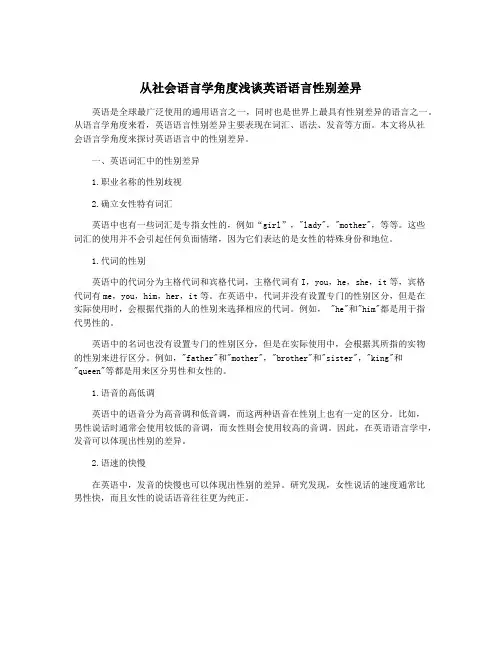
从社会语言学角度浅谈英语语言性别差异英语是全球最广泛使用的通用语言之一,同时也是世界上最具有性别差异的语言之一。
从语言学角度来看,英语语言性别差异主要表现在词汇、语法、发音等方面。
本文将从社会语言学角度来探讨英语语言中的性别差异。
一、英语词汇中的性别差异1.职业名称的性别歧视2.确立女性特有词汇英语中也有一些词汇是专指女性的,例如“girl”,"lady","mother",等等。
这些词汇的使用并不会引起任何负面情绪,因为它们表达的是女性的特殊身份和地位。
1.代词的性别英语中的代词分为主格代词和宾格代词,主格代词有I,you,he,she,it等,宾格代词有me,you,him,her,it等。
在英语中,代词并没有设置专门的性别区分,但是在实际使用时,会根据代指的人的性别来选择相应的代词。
例如, "he"和"him"都是用于指代男性的。
英语中的名词也没有设置专门的性别区分,但是在实际使用中,会根据其所指的实物的性别来进行区分。
例如,"father"和"mother","brother"和"sister","king"和"queen"等都是用来区分男性和女性的。
1.语音的高低调英语中的语音分为高音调和低音调,而这两种语音在性别上也有一定的区分。
比如,男性说话时通常会使用较低的音调,而女性则会使用较高的音调。
因此,在英语语言学中,发音可以体现出性别的差异。
2.语速的快慢在英语中,发音的快慢也可以体现出性别的差异。
研究发现,女性说话的速度通常比男性快,而且女性的说话语音往往更为纯正。
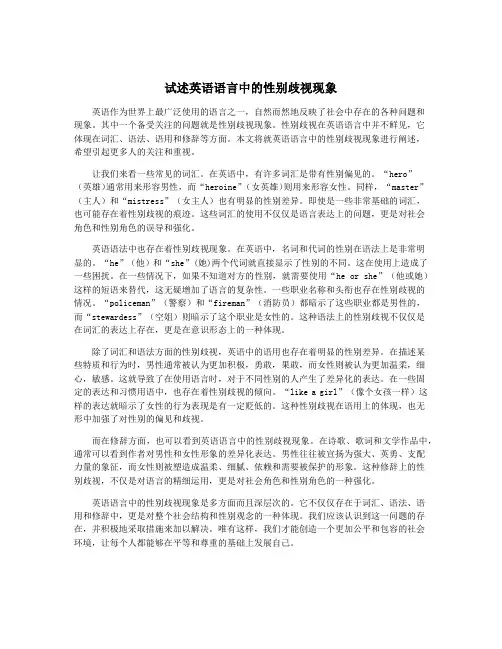
试述英语语言中的性别歧视现象英语作为世界上最广泛使用的语言之一,自然而然地反映了社会中存在的各种问题和现象。
其中一个备受关注的问题就是性别歧视现象。
性别歧视在英语语言中并不鲜见,它体现在词汇、语法、语用和修辞等方面。
本文将就英语语言中的性别歧视现象进行阐述,希望引起更多人的关注和重视。
让我们来看一些常见的词汇。
在英语中,有许多词汇是带有性别偏见的。
“hero”(英雄)通常用来形容男性,而“heroine”(女英雄)则用来形容女性。
同样,“master”(主人)和“mistress”(女主人)也有明显的性别差异。
即使是一些非常基础的词汇,也可能存在着性别歧视的痕迹。
这些词汇的使用不仅仅是语言表达上的问题,更是对社会角色和性别角色的误导和强化。
英语语法中也存在着性别歧视现象。
在英语中,名词和代词的性别在语法上是非常明显的。
“he”(他)和“she”(她)两个代词就直接显示了性别的不同。
这在使用上造成了一些困扰。
在一些情况下,如果不知道对方的性别,就需要使用“he or she”(他或她)这样的短语来替代,这无疑增加了语言的复杂性。
一些职业名称和头衔也存在性别歧视的情况。
“policeman”(警察)和“fireman”(消防员)都暗示了这些职业都是男性的,而“stewardess”(空姐)则暗示了这个职业是女性的。
这种语法上的性别歧视不仅仅是在词汇的表达上存在,更是在意识形态上的一种体现。
除了词汇和语法方面的性别歧视,英语中的语用也存在着明显的性别差异。
在描述某些特质和行为时,男性通常被认为更加积极,勇敢,果敢,而女性则被认为更加温柔,细心,敏感。
这就导致了在使用语言时,对于不同性别的人产生了差异化的表达。
在一些固定的表达和习惯用语中,也存在着性别歧视的倾向。
“like a girl”(像个女孩一样)这样的表达就暗示了女性的行为表现是有一定贬低的。
这种性别歧视在语用上的体现,也无形中加强了对性别的偏见和歧视。
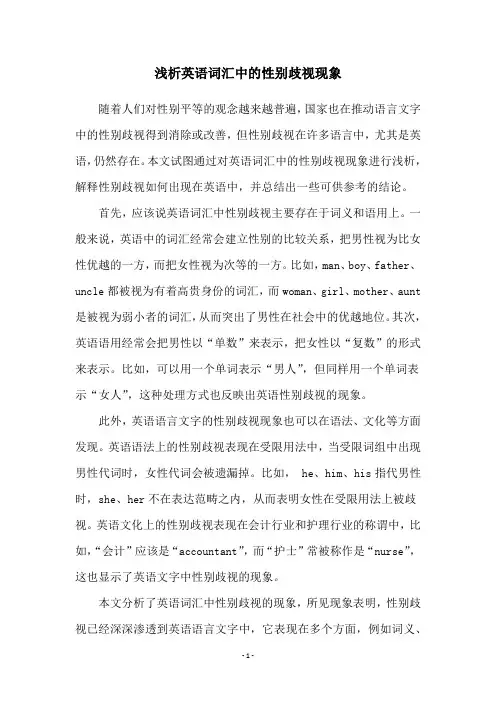
浅析英语词汇中的性别歧视现象随着人们对性别平等的观念越来越普遍,国家也在推动语言文字中的性别歧视得到消除或改善,但性别歧视在许多语言中,尤其是英语,仍然存在。
本文试图通过对英语词汇中的性别歧视现象进行浅析,解释性别歧视如何出现在英语中,并总结出一些可供参考的结论。
首先,应该说英语词汇中性别歧视主要存在于词义和语用上。
一般来说,英语中的词汇经常会建立性别的比较关系,把男性视为比女性优越的一方,而把女性视为次等的一方。
比如,man、boy、father、uncle都被视为有着高贵身份的词汇,而woman、girl、mother、aunt 是被视为弱小者的词汇,从而突出了男性在社会中的优越地位。
其次,英语语用经常会把男性以“单数”来表示,把女性以“复数”的形式来表示。
比如,可以用一个单词表示“男人”,但同样用一个单词表示“女人”,这种处理方式也反映出英语性别歧视的现象。
此外,英语语言文字的性别歧视现象也可以在语法、文化等方面发现。
英语语法上的性别歧视表现在受限用法中,当受限词组中出现男性代词时,女性代词会被遗漏掉。
比如, he、him、his指代男性时,she、her不在表达范畴之内,从而表明女性在受限用法上被歧视。
英语文化上的性别歧视表现在会计行业和护理行业的称谓中,比如,“会计”应该是“accountant”,而“护士”常被称作是“nurse”,这也显示了英语文字中性别歧视的现象。
本文分析了英语词汇中性别歧视的现象,所见现象表明,性别歧视已经深深渗透到英语语言文字中,它表现在多个方面,例如词义、语用、受限用法和文化等,都像一层漆,以及对社会现实中存在的男性优越感造成的支持。
所以,我们应该认识到,英语语言文字的性别歧视是一个很严重的问题,也是一个需要重视的问题,因此,人们应该以重视平等的态度,努力消除性别歧视,促进社会的性别平等。
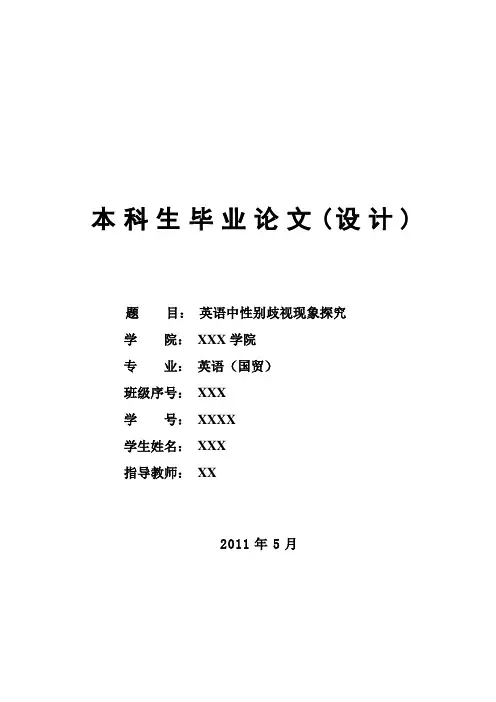
本科生毕业论文(设计)题目:英语中性别歧视现象探究学院:XXX学院专业:英语(国贸)班级序号:XXX学号:XXXX学生姓名:XXX指导教师:XX2011年5月On Research of the Sexism in English LanguageA Thesis SubmittedIn Partial fulfilment for theRequirements of the Degree ofBACHELOR OF ARTSDepartment of EnglishLIAONING NORMAL UNIVERSITMay, 2011AbstractIn our society, women are often regarded as the weaker sex and are looked down upon. This gender bias can also be found in the English language. Such language is called sexist language. This paper is devoted to the study of sexism in the English language and on how to avoid sexism. To start with, the thesis analyses the phenomena of sexism in English by using universal evidence, and they are shown and discussed in four aspects: English proverbs, English expressions, English vocabulary and the meanings of English words. Then the thesis traces the reasons for the occurrence of sexism in the English language. In nature, sexism in language reflects sexism in society. The two are closely related. Social connotations of sexism in English tell the relationship between phenomenon of sexism in language and essence of sexism in society. Lastly, the thesis introduces two feasible strategies to erase sexism in English language, and they are: language reform and social reform. The most important one is to erase the sexist conceptions and i mprove women‟s status, respect and support them. The language transformation can be realistic on the basis of the social reform.Keywords: sexism; phenomenon; factors; masculine words; strategies摘要在我们的社会中,妇女通常被认为是弱势群体而被轻视。
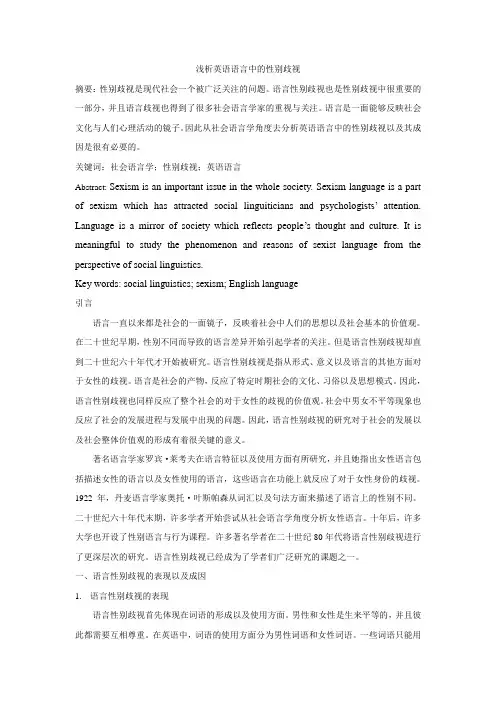
浅析英语语言中的性别歧视摘要:性别歧视是现代社会一个被广泛关注的问题。
语言性别歧视也是性别歧视中很重要的一部分,并且语言歧视也得到了很多社会语言学家的重视与关注。
语言是一面能够反映社会文化与人们心理活动的镜子。
因此从社会语言学角度去分析英语语言中的性别歧视以及其成因是很有必要的。
关键词:社会语言学;性别歧视;英语语言Abstract: Sexism is an important issue in the whole society. Sexism language is a part of sexism which has attracted social linguiticians and psychologists’attention. Language is a mirror of society which reflects people’s thought and culture. It is meaningful to study the phenomenon and reasons of sexist language from the perspective of social linguistics.Key words: social linguistics; sexism; English language引言语言一直以来都是社会的一面镜子,反映着社会中人们的思想以及社会基本的价值观。
在二十世纪早期,性别不同而导致的语言差异开始引起学者的关注。
但是语言性别歧视却直到二十世纪六十年代才开始被研究。
语言性别歧视是指从形式、意义以及语言的其他方面对于女性的歧视。
语言是社会的产物,反应了特定时期社会的文化、习俗以及思想模式。
因此,语言性别歧视也同样反应了整个社会的对于女性的歧视的价值观。
社会中男女不平等现象也反应了社会的发展进程与发展中出现的问题。
因此,语言性别歧视的研究对于社会的发展以及社会整体价值观的形成有着很关键的意义。
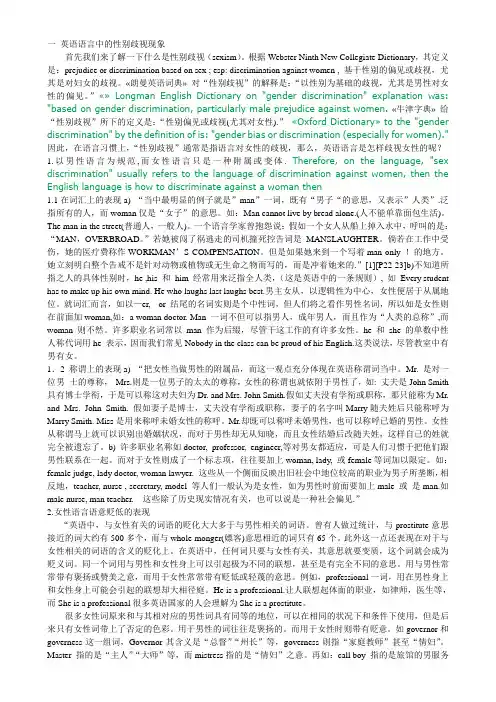
一英语语言中的性别歧视现象首先我们来了解一下什么是性别歧视(sexism)。
根据Webster Ninth New Collegiate Dictionary,其定义是:prejudice or discrimination based on sex ; esp: discrimination against women , 基于性别的偏见或歧视,尤其是对妇女的歧视。
«朗曼英语词典»对“性别歧视”的解释是:“以性别为基础的歧视,尤其是男性对女性的偏见。
”«»Longman English Dictionary on "gender discrimination" explanation was: "based on gender discrimination, particularly male prejudice against women. «牛津字典»给“性别歧视”所下的定义是:“性别偏见或歧视(尤其对女性).”«Oxford Dictionary» to the "gender discrimination" by the definition of is: "gender bias or discrimination (especially for women)."因此,在语言习惯上,“性别歧视”通常是指语言对女性的歧视,那么,英语语言是怎样歧视女性的呢?1.以男性语言为规范,而女性语言只是一种附属或变体.Therefore, on the language, "sex discrimination" usually refers to the language of discrimination against women, then the English language is how to discriminate against a woman then1.1在词汇上的表现a) “当中最明显的例子就是”man”一词,既有“男子“的意思,又表示”人类”.泛指所有的人,而woman仅是“女子”的意思。
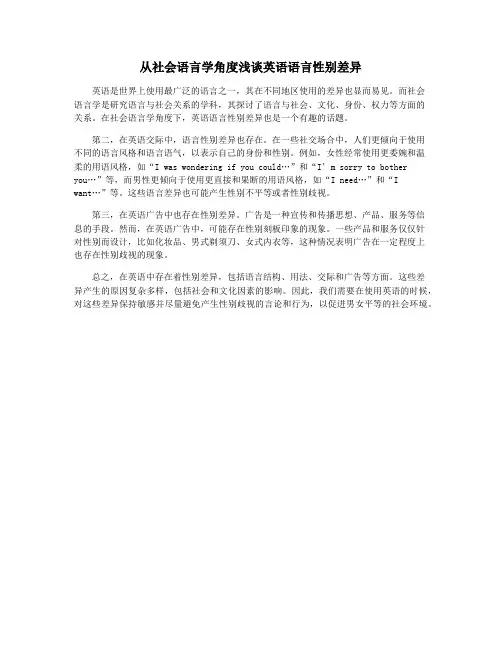
从社会语言学角度浅谈英语语言性别差异
英语是世界上使用最广泛的语言之一,其在不同地区使用的差异也显而易见。
而社会
语言学是研究语言与社会关系的学科,其探讨了语言与社会、文化、身份、权力等方面的
关系。
在社会语言学角度下,英语语言性别差异也是一个有趣的话题。
第二,在英语交际中,语言性别差异也存在。
在一些社交场合中,人们更倾向于使用
不同的语言风格和语言语气,以表示自己的身份和性别。
例如,女性经常使用更委婉和温
柔的用语风格,如“I was wondering if you could…”和“I’m sorry to bother you…”等,而男性更倾向于使用更直接和果断的用语风格,如“I need…”和“I want…”等。
这些语言差异也可能产生性别不平等或者性别歧视。
第三,在英语广告中也存在性别差异。
广告是一种宣传和传播思想、产品、服务等信
息的手段。
然而,在英语广告中,可能存在性别刻板印象的现象。
一些产品和服务仅仅针
对性别而设计,比如化妆品、男式剃须刀、女式内衣等,这种情况表明广告在一定程度上
也存在性别歧视的现象。
总之,在英语中存在着性别差异,包括语言结构、用法、交际和广告等方面。
这些差
异产生的原因复杂多样,包括社会和文化因素的影响。
因此,我们需要在使用英语的时候,对这些差异保持敏感并尽量避免产生性别歧视的言论和行为,以促进男女平等的社会环境。
试述英语语言中的性别歧视现象
英语语言中存在着性别歧视现象,表现在词汇、语法和表达方式等多个方面。
性别歧视也体现在英语语法中。
在第三人称单数代词中,he(他)常常被用作通用的
代词,即使指代的是男女都有的事物。
这使得女性在表达中更容易被忽视或缺席,反映了
对于男性的优先性和女性的较低地位。
类似地,许多动词和形容词都有男性和女性的形式,如manly(男性特征的)和womanly(女性特征的)。
这种语言上的划分也给人们灌输了一种对于“男性气质”的推崇,而对于“女性气质”的贬低。
英语中一些习语和成语也充斥着性别歧视。
“throw like a girl”(像女孩子扔东西)这种说法暗示女性体力较弱,低估了女性的潜力。
再如,“boys will be boys”(男孩就是男孩)这句成语暗指男性有些冲动、粗鲁的行为是可以被接受的,而女性则被要求更为
收敛和规矩。
这些成语和习语都在潜移默化中强化了性别刻板印象,对于男女的期待和评
价有着明显的偏见。
英语语言中存在着性别歧视现象,这体现在词汇、语法和表达方式等多个方面。
这些
偏见和歧视对于社会的性别平等产生了负面影响,需要我们关注和反思,努力消除性别歧视,实现性别平等。
英语语言性别歧视现象及其文化内涵性别歧视是指因性别而对个人进行不公平的区分或不公平的对待。
而言语则是人类交流的重要工具,但在语言中也存在着对性别的歧视。
英语作为世界上使用最广泛的语言之一,自然也存在着性别歧视的现象。
这种现象不仅仅是语法和语言结构上的问题,更涉及到文化内涵和社会意识形态。
本文将探讨英语语言中的性别歧视现象及其文化内涵。
英语语言中的性别歧视现象主要体现在两个方面:名词性别和代词使用。
首先是名词性别,英语中的很多名词是有性别区分的,例如“steward”和“stewardess”、“policeman”和“policewoman”等。
这种名词的性别区分实际上反映了社会的性别角色划分,强调了男女在特定职业或特定角色中的不同地位。
其次是代词使用,英语中的代词“he”和“she”也是性别化的,而且在很多情况下,“he”常常被用作中性代词,而“she”则被特指为女性。
这种代词的使用也暗含了社会对性别的刻板印象和定位,对女性的忽视和边缘化。
英语语言中的性别歧视现象还体现在一些固定搭配和习语中。
“man of the house”就是一个典型的固定搭配,这种搭配强调了男性在家庭中的权威地位,而对女性的忽视和边缘化。
在英语中还存在着很多以男性为代表的习语,例如“the man in the street”、“a man's job”等,这些习语实际上也是对女性的不公平对待和歧视。
除了语言结构和固定搭配,英语中的性别歧视还体现在文化内涵和社会意识形态上。
英语国家的文化中,男性往往被视为坚强、有能力,而女性则被视为柔弱、需要保护,这种观念在语言中得到了体现。
相比之下,许多其他语言中并没有这种性别划分,或者性别划分并没有那么明显。
这种文化内涵和社会意识形态的影响不仅限于英语国家,而是对整个世界的性别认知和性别角色划分产生了影响。
解决英语语言中的性别歧视问题,首先需要从语言结构上加以改变。
可以采取使用中性化的名词来替代性别化的名词,例如用“flight attendant”来替代“stewardess”,用“police officer”来替代“policeman/policewoman”。
英语语言性别歧视现象及其文化内涵【摘要】英语语言中存在着明显的性别歧视现象,表现在词汇、语法和修辞等方面。
这种歧视导致了性别刻板印象的形成,进而影响文化对语言性别歧视的看法。
在语言中,性别不平等的体现不仅限于单词选择,还体现在表达方式、对话结构等方面。
这种歧视会对人们产生心理效应,造成自我认同感受挫折。
英语语言性别歧视的深层原因包括社会文化传统观念的影响、权力结构的失衡等因素。
为了改变这种现象,需要采取相应的策略,包括教育、媒体引导等途径。
未来,应当朝着语言平等的方向发展,打破性别歧视的桎梏,实现语言的真正包容和多元。
【关键词】英语语言,性别歧视,文化内涵,语言中的性别歧视表现,性别刻板印象,文化影响,性别不平等,心理效应,深层原因,改变策略,发展方向,语言平等。
1. 引言1.1 英语语言性别歧视现象及其文化内涵英语语言性别歧视现象是指在社会语言交流中存在着针对不同性别的偏见和歧视。
这种现象在英语中尤为突出,体现在词语、短语、句子结构等多个方面。
一些常用词汇中存在着性别化,如"fireman"(消防员)或"businessman"(商人)都暗示了男性的身份。
这种性别歧视在英语中表现得非常普遍,因此引起了社会的关注和讨论。
英语语言性别歧视现象背后蕴含着丰富的文化内涵。
这种性别歧视反映了社会中对男性和女性角色的刻板印象和期待。
在英语中,男性往往被描绘为强壮、聪明、领导能力强,而女性则被视为柔弱、细心、依赖他人。
这种性别定位的差异不仅影响着语言的表达方式,也塑造了人们的性别观念和行为模式。
理解英语语言性别歧视的文化内涵不仅有助于深入探讨这一现象的原因,也对改变这种现象提供了启示。
英语语言性别歧视现象及其文化内涵是一个复杂而重要的课题,只有充分认识和探讨这一问题,才能找到有效的解决之道。
在接下来的正文中,我们将详细探讨语言中的性别歧视表现、性别刻板印象的形成、文化对语言性别歧视的影响等方面,以更全面地理解并解决这一现象。
浅析英语谚语中的性别歧视现象及其成因1.1.引言引言引言语言与性别研究这一课题,一直备受社会语言学家的关注。
性别歧视的观念,萌生于人类明文发展之初,在数千年文化传统演变之中根深蒂固,早已渗透社会生活的方方面面。
人们用语言交流思想,而性别歧视源于人们的思想,因此,在语言中性别歧视的色彩随处可见。
视的色彩随处可见。
谚语是语言的核心和精华,是一种凝练的语言表达方式。
英国作家佩恩曾说:“民族之智慧在其谚语。
”英语作为世界上应用最广的语言,其中也存在着大量性别歧视的现象。
在此,笔者以女性主义为视角,浅析英语谚语中的性别歧视现象及其成因。
2.2.英语谚语中性别歧视的表现英语谚语中性别歧视的表现英语谚语中性别歧视的表现在社会化的过程中,女性因社会地位、生活方式、价值标准等不同于男性而体现出独特的文化特征。
这些文化特征反映到社会生活中,便形成了各种歧视女性的观念。
英语谚语作为英语国家文化观念的产物,必然会折射出男尊女卑的思想意识。
家文化观念的产物,必然会折射出男尊女卑的思想意识。
2.1女性的附属地位女性的附属地位从社会历史角度来看,自从人类发展到父系社会,人类社会就开始以男子为中心。
在东西方历史中,妇女都处于卑下的地位,都受到歧视。
英美国家盛行基督教,而女性的从属地位在《圣经》的创世篇中就有所体现。
根据《圣经》,上帝先造出男人,让他成为万物之源,世界的主宰,而女人只是男人身上的一根肋骨。
由此可见,《圣经》将男性放到了统治地位,而把女性作为男性的附属品和私有财产。
英语中有很多反映这种思想的谚语:的附属品和私有财产。
英语中有很多反映这种思想的谚语: A man of straw is worth of a woman of gold. (稻草男儿抵得上金玉女子。
)儿抵得上金玉女子。
)If the husband be not at home , there is nobody. (丈夫不在家,等于说没有人。
)夫不在家,等于说没有人。
国际跳棋教学课程设计一、课程目标知识目标:1. 学生能够理解并掌握国际跳棋的基本规则和术语,如棋盘布局、棋子的走法、吃子规则等。
2. 学生能够了解国际跳棋的历史起源和国际比赛中的基本策略。
3. 学生能够认识和运用基本的棋局分析方法,如棋型判断、威胁与保护等。
技能目标:4. 学生能够独立完成一局国际跳棋的对弈,并展示正确的棋子移动和策略运用。
5. 学生能够在对弈中灵活运用所学战术,如双跳、长跳等,提高自己的棋局掌控能力。
6. 学生通过参与小组讨论和实战演练,提升问题解决和团队协作能力。
情感态度价值观目标:7. 学生培养对国际跳棋的兴趣,增进对智力运动的认识和热爱。
8. 学生在对弈过程中学会尊重对手,培养良好的竞技精神和公平竞争意识。
9. 学生通过国际跳棋的学习,锻炼逻辑思维,提高专注力和决策能力,培养积极向上的学习态度。
课程性质:本课程注重理论与实践相结合,以学生为主体,通过互动式教学激发学生的兴趣和参与度。
学生特点:考虑到学生所在年级的特点,课程设计将充分考虑学生的认知水平、注意力集中时长和动手操作能力。
教学要求:教师需关注每个学生的学习进度,提供个性化指导,确保学生在掌握知识的同时,技能和情感态度价值观得到全面提升。
教学过程中,注重目标分解,通过具体学习成果的评估,持续优化教学策略。
二、教学内容1. 国际跳棋基本规则与术语:棋盘结构、棋子的种类及走法、吃子规则、胜负判定。
- 教材章节:第一章《国际跳棋入门》2. 国际跳棋基本策略:开局策略、中局战术、残局技巧。
- 教材章节:第二章《国际跳棋基本战术》3. 棋局分析方法:棋型分析、威胁与保护、棋局形势判断。
- 教材章节:第三章《国际跳棋棋局分析》4. 实战演练与战术应用:双跳、长跳等战术的应用,实战对弈中的策略调整。
- 教材章节:第四章《国际跳棋实战技巧》5. 国际跳棋历史与文化:国际跳棋的起源、发展历程、国际比赛及知名棋手介绍。
- 教材章节:第五章《国际跳棋历史与文化》教学安排与进度:- 第一周:国际跳棋基本规则与术语学习,进行简单的对弈练习。
探讨英语习语中性别歧视现象成因及对策习语是一个民族集体智慧的结晶,它形式简短、意韵丰富,为广大人民群众所喜闻乐道,其中包含的大量的对人生、修养、情感、家庭、生活和习俗等各方面的至理名言,它们催人奋进,陶冶情操。
然而,英语习语中也有许多包含了轻视、贬低妇女的性别歧视的成分,“性别歧视”根据Webster Ninth New Collegiate Dictionary,其定义是Prejudice or discrimination based on sex;esp.discrimination against women.基于性别的偏见或歧视,尤其是对妇女的歧视[6]。
1 习语中的性别歧视现象语言与社会相互依存,作为社会发展的产物,语言其实是现实的一面镜子,现实社会的种种现象,尽现其中,正如英国语言学家帕尔默所说:“语言忠实反映了一个民族的全部历史、文化、各种信仰和偏见。
”性别歧视在社会上的存在由来已久,而习语又是语言的最重要的表现形式之一,不可避免的,习语中会存在性别歧视现象,主要体现在以下几个方面:(1)英语习语中,当性别不明时,人称代词通常用阳性代词he,his,him来指代男女两性,如:He that travels far knows much.见多识广。
He laughs best who laughs last.谁笑在最后,谁笑的最好。
He who has an art has everywhere a part.有一计之长的人到处都可以立足。
He who does not reach the Great Wall is not a true man.不到长城非好汉。
当然,也有个别习语用到人称代词she, her,但通常都用在引起人们不愉快联想的习语中,如:The crow thinks her own birds fairest. 乌鸦总以为自己的雏鸟最美丽。
The old cow thinks she was never a calf.人老每忘本,不体童稚心。